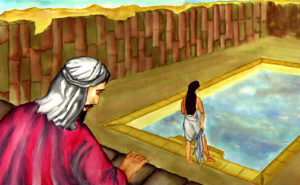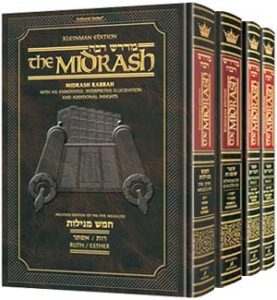We begin this week with a big mazel tov to Ronie and Meyer Jeger, he a friend of the Oisvorfer of kimat 45 years and she, since they met efsher 30+ years ago, on the very exciting news that their son Yaakov became engaged to Ayala Mendelowitz, she the daughter of Debby and Simcha Mendelowitz. A special mazel tov to bubbies Jeger and Zimmer and to both extended families.
And in the milestone department, mazel tov to another decades long chaver, Baruch Singer, upon the 50th anniversary, this coming Shabbis of his bar mitzvah.
Raboyseyee and Ladies
Medrish: True, or but color commentary?
A number of years back, the shvigermeister (mother-in-law) made the following remark to the Oisvorfer: I am really beginning to worry about you; your parsha reviews quite often reference sexual matters. This is not an exact quote; a few years have passed. Ober, the topic (and efsher her concerns) remain relevant. The Oisvorfer tried convincing the shvigger that it wasn’t him: he was but repeating and quoting either Rashi, who either opines, or mentions his primary source, or, directly from one of myriad medroshim that proffer on these subjects. We will soon explore what a medrish is; keep your pants on. Grada, not wanting to keep their pants on is the subject of a very interesting medrish we will avada discuss below. So happens, that for reasons we will also explore below, many a medrish did use sexual references to get their message across. Exhibit 1 is this week’s parsha of Bihaloischo which grada does not -in the text- discuss sexual matters. That did not however stop Rashi and others from teaching us that what the heylige Toirah meant to state was sexually related and charged. Sex sells! And with that introduction and now that we have your attention, let’s go veyter.
As we move along and through Sefer Bamidbar (Numbers), we are closing in on six full years of parsha reviews, kimat (nearly) all have been original pieces. Grada, every week, the Oisvorfer is anxious and on shpilkis mamish (pins and needles) thinking of what to write. What topics can he cover that haven’t already been reviewed? Taka that’s what happened this week. After reviewing previous postings on Bihaloischo and after noticing that we already well covered the; loshoin horo Miriam spoke about her own brother, and the consequences she suffered; whether or not Moishe had one or two wives and whether one or both were black and beautiful; Yisroy declining Moishe’s invitation to stay with the Yiddin; celibacy; the two upside down nuns; Aharoin’s job as the official midbar candelabra kindler; the ‘ananay-ha-kovod’ (clouds of glory) that traveled with the Yiddin; Pesach in the wilderness and Pesach Shaynee for those who were for various reasons tomay (impure); the misoininim (complainers), the quail, and a few other related topics, the Oisvorfer was quite worried: what shall he cover this year?
Before we answer, it so happens that parshas Bihaloischo has always been a favorite of the Oisvorfer davka because it brings back childhood memories. As mentioned, it contains the famous and oft talked about upside down nuns. The nun is, for those who don’t know, a hebrew letter which happens make the letter ‘n’ sound, and typically has a numerical value of 50. It’s most well known for adorning every dreidel but is famous in the heylige Toirah for appearing, as we stated, upside down. Not once, but twice, and the nuns are bookends for two special -efsher misplaced- pisukim which, time and space permitting, we will or won’t address soon. Ober, altz kind (lad), the upside down nuns, were worth 500 points each in the game of chumish which we played over and again though our fathers were constantly excoriating us to say a few words in the siddur. Does everyone agree? Not! Some say the nun is valued at 1000 points. Bottom line: if you landed on this parsha and found the nuns during your turn, you were an instant winner. And if you happen to have mentioned this to your pirchei leader, he might have selected you for some personal hugging and chapping, if you chap. Shoin.
 Ober the RBSO is great, mamish! A topic was needed and He sent one down. So happens that the Oisvorfer has been in a heated -very- argument these last two weeks with a not yet ready to be named individual (soon), whose views on the medrish are mamish polar opposite to those regularly espoused by the heylige Oisvorfer. Over the Yom Tov of Shovuis, the argument, as mentioned just last week, was over Dovid Hamelech and Batsheva (King David and Bathsheba). The unnamed individual believes that Dovid was innocent mamish -and certainly of having an illicit relationship- in the Batsheva affair, while the Oisvorfer stands firm (as efsher did Dovid), if you chap, that Dovid had dirty hands, and more, but that the RBSO forgave him, avada after punishing him with the death of a child born out of the rendezvous with Bathsheva and myriad other tzuris (anguish) that tormented Dovid for many years.
Ober the RBSO is great, mamish! A topic was needed and He sent one down. So happens that the Oisvorfer has been in a heated -very- argument these last two weeks with a not yet ready to be named individual (soon), whose views on the medrish are mamish polar opposite to those regularly espoused by the heylige Oisvorfer. Over the Yom Tov of Shovuis, the argument, as mentioned just last week, was over Dovid Hamelech and Batsheva (King David and Bathsheba). The unnamed individual believes that Dovid was innocent mamish -and certainly of having an illicit relationship- in the Batsheva affair, while the Oisvorfer stands firm (as efsher did Dovid), if you chap, that Dovid had dirty hands, and more, but that the RBSO forgave him, avada after punishing him with the death of a child born out of the rendezvous with Bathsheva and myriad other tzuris (anguish) that tormented Dovid for many years.
That same fellow believes that every medrish, or nearly every medrish, is real and is to be taken literally. Shoin, just like that, the Oisvorfer was back in business. And with a subject he mamish enjoys discussing; medrish and its use of sex talk. Is the medrish to be taken literally or not? All? Some? Any?
 And before we go veyter, let’s start with this: what is a medrish? Who were these people and why do we study their writings? The medrish or midrash is a collection of explanatory works on the heylige Toirah, Gemora and also the Tanach (Prophets). Medrish is meant to fill in the lacunas in the narrative of the text of which there (mistama by design) seemingly many. And whereas the heylige Mishneh and Gemora use Toirah text to extrapolate the proper interpretation of the mitzvis the RBSO set forth, many a medrish, and specifically medrish aggadah, are meant (in the Oisvorfer’s opinion) to infuse creative color. And what is a medrish aggadah you ask or should? Shoin, medrish aggadah contains fanciful stories (not having to do with Jewish law), about miracles and legends which are used to inspire ethical teachings. The medrish can often build an entire story out of one or a few words in the text. Medrish seeks to discover the inner meanings of the text. It’s an effective delivery system and also gishmak to read and write about. It’s meant to inspire and allow our imaginations to visualize. The medrish seeks to somehow explore the inner meaning of the written text. Medrish is a tool many rabbis, speakers and writers, including avada the Oisvorfer, refer to; its stories are gishmak and people love hearing and reading them. Not all compilers of the different collections of medrish, are known.
And before we go veyter, let’s start with this: what is a medrish? Who were these people and why do we study their writings? The medrish or midrash is a collection of explanatory works on the heylige Toirah, Gemora and also the Tanach (Prophets). Medrish is meant to fill in the lacunas in the narrative of the text of which there (mistama by design) seemingly many. And whereas the heylige Mishneh and Gemora use Toirah text to extrapolate the proper interpretation of the mitzvis the RBSO set forth, many a medrish, and specifically medrish aggadah, are meant (in the Oisvorfer’s opinion) to infuse creative color. And what is a medrish aggadah you ask or should? Shoin, medrish aggadah contains fanciful stories (not having to do with Jewish law), about miracles and legends which are used to inspire ethical teachings. The medrish can often build an entire story out of one or a few words in the text. Medrish seeks to discover the inner meanings of the text. It’s an effective delivery system and also gishmak to read and write about. It’s meant to inspire and allow our imaginations to visualize. The medrish seeks to somehow explore the inner meaning of the written text. Medrish is a tool many rabbis, speakers and writers, including avada the Oisvorfer, refer to; its stories are gishmak and people love hearing and reading them. Not all compilers of the different collections of medrish, are known.
The Oisvorfer’s late father, OBM, used to say and often repeat what others in his and in previous generations suggested about the medrish: if one believes them all to be emes, one is a fool; if one believes none to be true, he might be considered an apikoires (heathen and worse). The debate between those who believe medrish to be real mamish -it all happened as they wrote it- and those who believe that only some, perhaps little, of how they interpret text, is what really went down, is grada very relevant this week. Why? Well, let’s begin by reading a few pisukim form the text. Says the heylige Toirah (Bamidbar 11:4-10), azoy:
| 4 But the multitude among them began to have strong cravings. Then even the children of Israel once again began to cry, and they said, “Who will feed us meat? | דוְהָאסַפְסֻף אֲשֶׁר בְּקִרְבּוֹ הִתְאַוּוּ תַּאֲוָה וַיָּשֻׁבוּ וַיִּבְכּוּ גַּם בְּנֵי יִשְׂרָאֵל וַיֹּאמְרוּ מִי יַאֲכִלֵנוּ בָּשָׂר: | |
| 5 We remember the fish that we ate in Egypt free of charge, the cucumbers, the watermelons, the leeks, the onions, and the garlic. | הזָכַרְנוּ אֶת הַדָּגָה אֲשֶׁר נֹאכַל בְּמִצְרַיִם חִנָּם אֵת הַקִּשֻּׁאִים וְאֵת הָאֲבַטִּחִים וְאֶת הֶחָצִיר וְאֶת הַבְּצָלִים וְאֶת הַשּׁוּמִים: | |
| 6 But now, our bodies are dried out, for there is nothing at all; we have nothing but manna to look at.” | ווְעַתָּה נַפְשֵׁנוּ יְבֵשָׁה אֵין כֹּל בִּלְתִּי אֶל הַמָּן עֵינֵינוּ: | |
| 7 Now the manna was like coriander seed, and its appearance was like the appearance of crystal. | זוְהַמָּן כִּזְרַע גַּד הוּא וְעֵינוֹ כְּעֵין הַבְּדֹלַח: | |
| 8 The people walked about and gathered it. Then they ground it in a mill or crushed it in a mortar, cooked it in a pot and made it into cakes. It had a taste like the taste of oil cake. | חשָׁטוּ הָעָם וְלָקְטוּ וְטָחֲנוּ בָרֵחַיִם אוֹ דָכוּ בַּמְּדֹכָה וּבִשְּׁלוּ בַּפָּרוּר וְעָשׂוּ אֹתוֹ עֻגוֹת וְהָיָה טַעְמוֹ כְּטַעַם לְשַׁד הַשָּׁמֶן: | |
| 9 When the dew descended on the camp at night, the manna would descend upon it. | טוּבְרֶדֶת הַטַּל עַל הַמַּחֲנֶה לָיְלָה יֵרֵד הַמָּן עָלָיו: | |
| 10 Moses heard the people weeping with their families, each one at the entrance to his tent. The Lord became very angry, and Moses considered it evil. | יוַיִּשְׁמַע משֶׁה אֶת הָעָם בֹּכֶה לְמִשְׁפְּחֹתָיו אִישׁ לְפֶתַח אָהֳלוֹ וַיִּחַר אַף יְהֹוָה מְאֹד וּבְעֵינֵי משֶׁה רָע: |
Says Rashi on posik 10 and specifically on the words ‘boichem limishpichoisom’ (crying for their families), and who knew more than did Rashi, azoy: they were longing for the sex now forbidden with family members. Rashi says what? Let’s look at that again. Rashi, quoting our sages, says azoy: what they were crying about was taka family related. What was bothering them was that many familiar sexual relationships were now (following Matan Toirah) verboten. No longer could one have sexual relations with the shvigger, or with, assorted other close relatives notwithstanding how hot they were, or how attracted one was. See parshas Achrei Mois for a full list of the forbidden. Seemingly, such relationships -some of them- were kosher and mistama normative behavior prior to the acceptance of the heylige Toirah, but now, fartig; over and out! The misoininim (complainers) missed that. After all, many taka do have a hot sister-in-law or tanta. The medrish will throw some color and tell us more, much more. When the Yiddin were asking in posik Daled (verse 4) “who will feed us meat”, it was not a good rib steak or even a succulent sizzling burger they were hungry for. Instead, the meat they desired to chew on, was with a hot mishpocho member. And when they cried out for onions, in posik Hey (verse 5), it wasn’t because they were peeling onions and their eyes were burning. Instead, says the medrish, their cries for onions too, was a euphemism for forbidden sex. Oy vey! One can only imagine what they were longing for when they mentioned cucumbers, leeks, melons and garlic (see posik 5 above). Nu, efsher we can kler that only a few rogue yeshiva rebbes were asking for cucumbers, if you chap. Veyter. The bottom line (according to the medrish) was this: they wanted sex and not just regular sex. They davka wanted sex with their own relatives, shreklich as that sounds and say it’s not so please.
Nu, just this past Monday the Oisvorfer was back discussing and arguing with that very individual. Grada, he has learned the heylige Gemora in its entirety at least once. He maintains the medrish is literal and when medrish tells us that what the Yiddin were longing for (when requesting onions), was forbidden relations, it’s real. Case closed. And despite the fact that all they asked for was meat, veggies and watermelon, he cannot be persuaded otherwise. Moreover, he thinks the Oisvorfer is one of the world’s worst people for thinking and espousing otherwise, and has so stated.
Ober, the heylige Oisvorfer asked him azoy: “if what you are suggesting is taka emes, if taka they asked about meat and onions, but were mamish thinking sex with mishpocho members, why did the RBSO send them quail, some type of pheasant, in response? They asked for meat and got meat. If they were asking for sex with family members, or with others, why not throw an orgy and then punish them?” His answer: “excellent question; let me think on it.” That was on Monday. Let’s recall the text above: they asked for something meaty and got quail. In fact, the RBSO was upset mamish with their request and many (we don’t know how many) died while eating it. Ober they did not die while having sex. That of course will happen in a few weeks when the Yiddin hook up with the Moabite shiksas; stay tuned. The RBSO was sending a stern message: stop complaining about the so-called free fish you were (supposedly) given in Mitzrayim. Stop your whining about meat, watermelon, onions and other veggies. I’ll stuff you with so much quail, it will mamish kill you. Is the medrish then suggesting that each and every requested item represented a different family member? Ver veyst, but mistama not.
 And the question is azoy. Why does medrish take literary license to go outside the box and assert that the plain meaning of the words, is not pshat? Why does medrish takes liberties by introducing fanciful miracles and other myses (stories) that are at times seemingly and plainly inconsistent with truth, as real pshat? What happened to the concept of not going outside the box of the accepted meaning of the text? Doesn’t the heylige Gemora (Shabbis 63a) teach us that ‘a verse cannot depart from its plain meaning?’ It does! Do the words of the heylige Toirah not mean what they say?
And the question is azoy. Why does medrish take literary license to go outside the box and assert that the plain meaning of the words, is not pshat? Why does medrish takes liberties by introducing fanciful miracles and other myses (stories) that are at times seemingly and plainly inconsistent with truth, as real pshat? What happened to the concept of not going outside the box of the accepted meaning of the text? Doesn’t the heylige Gemora (Shabbis 63a) teach us that ‘a verse cannot depart from its plain meaning?’ It does! Do the words of the heylige Toirah not mean what they say?
As oisvorfer followers quite well know, the Oisvorfer, has been scouring and voraciously reading medroshim for a good number of years. He also checks out the heylige Gemora from time to time (as needed), or, when he has trouble falling asleep. He holds farkert; many a medrish is but beautiful color commentary, containing many gems mamish, on the heylige Toirah, Gemora and Tanach. Its authors were but stating their own fanciful views. And for reasons we shall explore shortly, interjected sex talk to make their point or make the story come alive. They were quite successful; medrish remains, generations later, extremely popular. As an aside, the Oisvorfer is not alone in his beliefs as we will shortly prove. Which view is accurate? Is the Oisvorfer out of bounds for even suggesting that many medroshim, albeit not all, are likely but commentary and have little relationship to the facts as written and described in the heylige Toirah?
Grada, on this very subject of medrish and the misoininim (complainers about meat and more), Rav Yaakov Kamenetsky asks this question? How can the medrish put words in the mouths of the complainers? They asked for meat; who gives medrish license to suggest and state with certitude and fact, that what they wanted was forbidden familial sex? Ober his answer is brilliant mamish and taka does explain this and many other sexually charged and other seemingly outlandish medroshim. Said he in his sefer Emes L’Yaakov (a must read), azoy: chazal (our sages) many times put a far more sinister interpretation on what would otherwise seem to be innocent comments found in the text of the heylige Toirah. You hear this raboyseyee? In other words: despite the fact that the words spoken may have been innocuous and meant exactly as they were spoken, medrish spun the words or events which took place to indict those who spoke them and those appearing in the stories. It’s mamish a chiddish (breakthrough). He cites several examples ober to make the point, let’s look at but one more.
Back in sefer Bereishis, when Avrohom suggested to his nephew Loit that they separate and gave him the opportunity to select first the land he wanted, said Loit azoy. I want the land near, or in Sedoim (Sodom) because it’s fertile. Let’s avada recall that Loit was a shepherd; of course he wanted fertile land. Reads and sounds innocent enough and that’s all the heylige Toirah tells us about his decision. Ober says the medrish, no! Loit davka selected Sedoim because it was fertile with women, depravity, sex orgies and efsher some bestiality and homosexuality for good measure. Loit was nothing but a low life. And the shaylo (question) is azoy? What’s wrong with the words Loit used and why shouldn’t we take him at his word? Did he ever mention to uncle Avrohom that he davka wanted the Sedoim area for its Las Vegas life style? He did not! Ober the medrish paints him differently.
Said Reb Yaakov Kamenetsky so mamish gishmak, azoy: our sages, and specifically those who wrote these sexually charged medroshim, understood man and his thoughts. Case closed! Adds the Oisvorfer azoy: Men and mistama many women are but chazerim. Fartig! Our sages chapped that people have subconscious feelings and desires that drive us to make decisions. Such feelings are at times lying beneath the surface; people may not even consciously be aware to them. In other words: Loit said fertile land, subconsciously he meant sex. The misoininim asked for meat, onions and more; they too wanted sex.
Ober how did our sages know this to be emes to a point where they constantly employ such logic to verse interpretation? Did they consider all humans to be chazerim and depraved? How could they know what Loit was thinking about? How did they know that though Loit was but a shepherd, he also wanted to show off his farming skills by plowing and seeding, if you chap?
 We are left with two choices to ponder. Chazal either knew these things to be true through ruach hakoidesh (inspired by a holy spirit), or they chapped human thought and behavior because they too were humans. They too had inner subconscious feelings and therefore chapped how people think and act. Seemingly the message was azoy: it’s taka emes that we humans have depraved thoughts, we say A when we really mean B. That’s the yetzer horo (evil inclination) working behind the scenes. Our job is to overcome him. Avada this is easier said than done.
We are left with two choices to ponder. Chazal either knew these things to be true through ruach hakoidesh (inspired by a holy spirit), or they chapped human thought and behavior because they too were humans. They too had inner subconscious feelings and therefore chapped how people think and act. Seemingly the message was azoy: it’s taka emes that we humans have depraved thoughts, we say A when we really mean B. That’s the yetzer horo (evil inclination) working behind the scenes. Our job is to overcome him. Avada this is easier said than done.
Many have written on the topic of medrish: how are we to understand them? Literally or figuratively? The Oisvorfer closes by quoting the Rambam (Maimonides) who said azoy in his introduction to the Guide foe the Perplexed: “there are passages in the midrash ‘which if taken literally’, appear to be inconsistent with the truth and common sense, and must therefore be taken figuratively.” As an aside, the Rambam is not alone, many agree. Ober, efsher because they were written by men of great wisdom, many, including the individual with whom the disagreement rages, believes farkert. The world can accommodate both views and both have their supporters.
A gittin Shabbis
The Oisvorfer Ruv
Yitz Grossman

![[ File # csp8317961, License # 1990404 ] Licensed through http://www.canstockphoto.com in accordance with the End User License Agreement (http://www.canstockphoto.com/legal.php) (c) Can Stock Photo Inc. / bbbar](https://oisvorfer.com/wp-content/uploads/2016/06/TrueFalse-300x199.jpg)